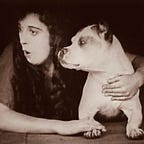Just Show Up
The Importance of Being Seen
How often have you entered a public space, whether on social media or in-person, where some “expert” purporting to know you — and, by extension, your group — describes you in such a way as to render you unrecognizable to yourself or your community? I call this rhetorical process that of being “invisibilized” by others. Yes, it’s an ugly word, and it’s not exactly one that exists in the Oxford English Dictionary. However, it does exist on Wicktionary: “To make invisible; to marginalize so as to erase the presence or contributions of.” It’s an ugly word for an ugly process, what amounts to the verbal equivalent of using an assault weapon on another human being’s existence.
One’s identity or affiliation, whether political party, race, gender, or status as a member or ally of the LGBTQ community, seems to give license for people to make a lot of false assumptions about who you are. I’ll only speak about personal experience here, but I suspect I’m not alone in having had family members who, in response to our support of child’s gender transition, invisibilize my child and myself by longer acknowledging our existence. Our phone calls or birthday and holiday gifts are not acknowledged — nor are they given to my son. But it’s not this overt form of rejection that upsets me. It’s the complete lack of curiosity or basic interest. Simply for supporting my child, my family dismissed me, in their words, as the caricature of the “extreme liberal.” Although this specific context of “invisibilizing” is personal for me, it seems like it happens all the time. I left social media, in part, because I kept seeing people reduce each other and events to stereotypes. If you study the past, you know that invisibilizing has a bloody tradition in the US and it’s getting bloodier. Even ordinary interactions seem to be symptomatic of the diseased state of our civil culture.
It’s like COVID and our political partisanship have atrophied some essential courtesies of ordinary interaction. Idle chit-chat in public spaces is a kind of social glue that has begun to lose its cohesiveness. As a friend said to me recently, “Don’t you think that when people don’t see or talk to each other, they start to make up stories in their heads?” She was talking about her kid’s college roommate. When they don’t see each other at least once a week, they start to “find” things to argue about. They start to make up stories in their heads about why so-and-so is acting a certain way or make false attributions about so-and-so’s individual moods or subtle reactions. Does this sound familiar?
It does to me. It was this friend’s comment that led me to take my son up on his request to visit his grandpa on our COVID-delayed visit to my home state. Had I been making up a story in my head about why they hadn’t responded to any calls or seemed not to want to see us? My son already knew that I’d reached out multiple times to tell family when we’d be arriving and provide contact information, but those messages had not been reciprocated. It wasn’t him, my husband and I explained, it was them. They needed time to make sense of this change that was not part of their experience and that had challenged their understanding.
We had not seen each other — that is, my dad and step-mom had not seen my son since his transition — not since he was eleven, not long before COVID disrupted everything. Now, at fourteen, my son’s voice had deepened and the faint shadow of facial hair now darkened his upper lip. In this new, mature voice, he said, “Mom. Let’s just show up on their doorstep.” My internal gut-check had me scared. What if they won’t see us? What if they mis-gender him? What if they say something hurtful? The “what-ifs” throbbed inside me all the way to the front door and into the living room, where we were eventually welcomed after we rang the doorbell, waited for what seemed like hours, and finally called through the sliding screen door. “Happy Belated Father’s Day!” waving treats we’d brought for the occasion.
It was awkward. They sat in their chairs; we on the couch. Their old dog wagging its tail and tottering over on its arthritic legs expressed more joy than any of us on this occasion. We talked about the weather, about the garden, about the heat. As I cast my eyes around the room, I spotted something that made me realize that I’d been holding my breath this whole time. The photograph I sent for Father’s Day, only a few weeks ago — my son’s most recent school photo — was on the mantel framed and displayed with the other grandkids. I exhaled and thought, “Wow.”
My son noticed the photograph too. We were there an hour without incident. They asked my son about school and laughed that he was just an inch or so taller than his grandpa. We were joking together once more. I told them I loved them. They gave their grandchild a hug at the end and waved as our car pulled away. “No matter what happens next,” I thought to myself, “I will have some peace.” A few minutes later, my son turned to me and said, simply, “That was the right thing to do.” He needed them to see him. I’m glad I listened.
My son taught me something important: just show up. See and be seen — on your terms. If we do this, maybe together we can rewrite all the stories.
